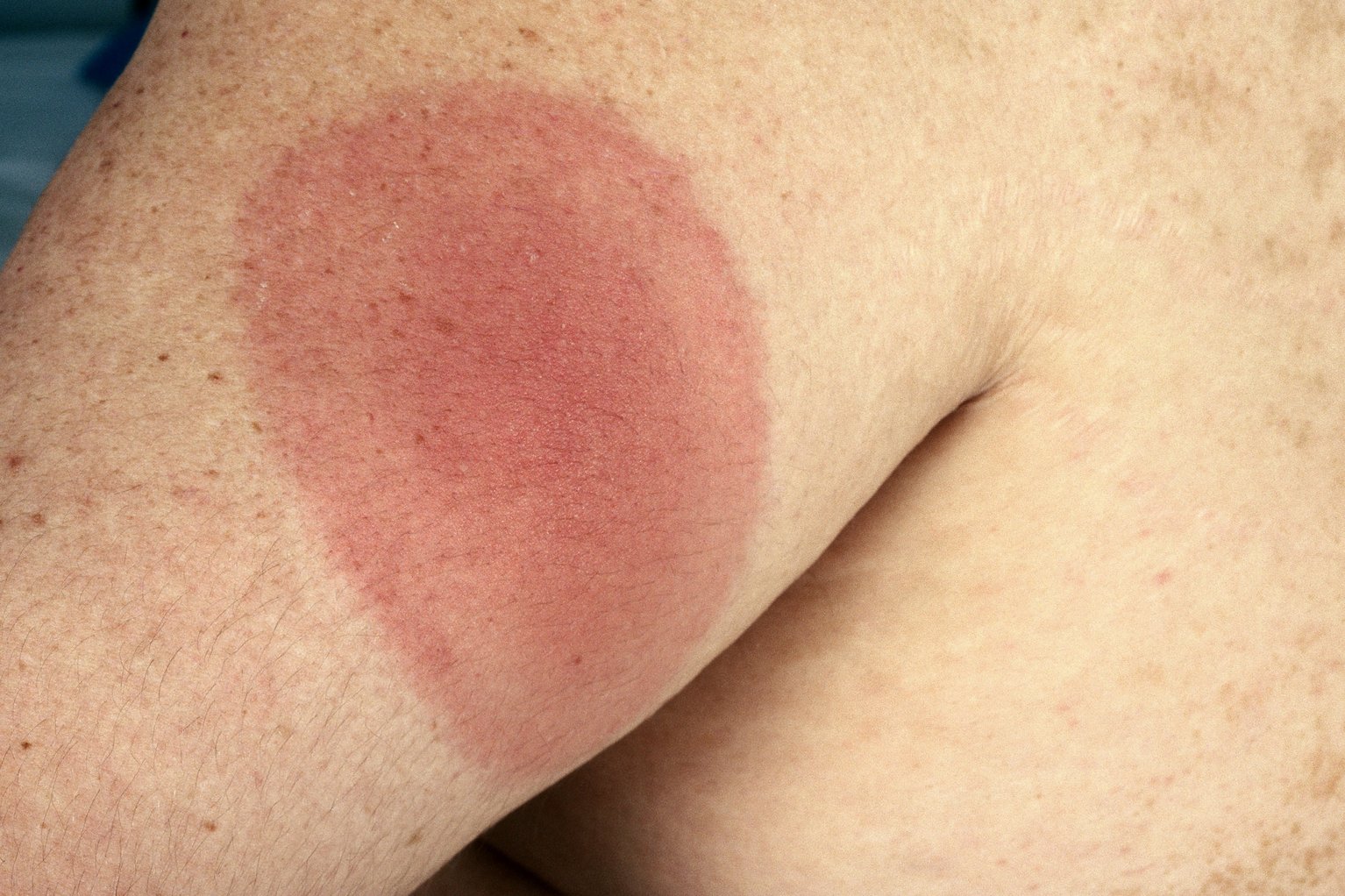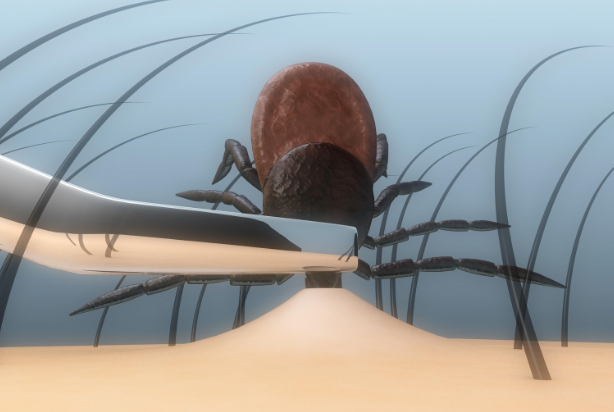Tick bite
Most tick bites are harmless and only a small number of ticks are infected with the bacteria that cause Lyme disease.

A tick bite can only cause Lyme disease in humans if the tick has already bitten an infected animal. Ticks that may cause Lyme disease are found all over the UK, but high-risk areas include grassy and wooded areas in southern England. Ticks are most active in spring, summer and early autumn. Symptoms appear on average 14 days after the tick bite, however can occur between 2 days and 3 months.
Picture credit: Skin Deep
Please see your GP if your child experiences any of these symptoms after a tick bite: You will need to inform your GP that your child had a tick bite.
- A circular red rash around the area of the bite. The rash may be white in the middle and look like a “bulls eye”. Click here for pictures of the rash
- Hot and shivery
- Headaches
- Aching joints and muscles
- Muscle weakness
- Extreme tiredness
- Tender glands
- Feeling sick
- Facial weakness (droop on one side of the face)
Treatment for Lyme disease is with antibiotics and is most effective if started as early as possible.
Antibiotics are not used for prevention of Lyme disease following simple tick bites.
Speak to your doctor if your symptoms come back after treatment with antibiotics or they do not start to improve
Do not worry if all of the tick has not been removed. Please do not try to dig out retained parts as this will increase the risk of skin infection. Retained parts will usually work their way out within a couple of days.
Prevention:
- Cover your skin, wear long trousers and boots and tuck trousers into socks when walking in long grass
- Examine yourself and your children for tick after exposure and remove all ticks as soon as possible. Some ticks can be tiny, no bigger than a pencil dot
Tick removal
- Tick removal guidance from the Lyme Disease Action
- Video from Public Health England on ticks and how to remove them

Where should you seek help?
- If it is non-urgent speak to your local pharmacist or health visitor
- If your child has any of the above features, urgently see your GP. For an urgent out-of-hours GP appointment, call NHS 111
- You should only call 999 or go to your nearest A&E department in critical or life threatening situations
For wear and tear, minor trips and everything in between.
Self-care
You can treat your child's very minor illnesses and injuries at home.
Some illnesses can be treated in your own home with support and advice from the services listed when required, using the recommended medicines and getting plenty of rest.
Sound advice
Children can recover from illness quickly but also can become more poorly quickly; it is important to seek further advice if a child's condition gets worse.
For information on common childhood illnesses go to What is wrong with my child?
Pharmacists are experts in many aspects of healthcare and can offer advice on a wide range of long-term conditions and common illnesses such as coughs, colds and stomach upsets. You don’t need an appointment and many have private consultation areas, so they are a good first port of call. Your pharmacist will say if you need further medical attention.
Sound advice
- Visit a pharmacy if your child is ill, but does not need to see a GP.
- Remember that if your child's condition gets worse, you should seek further medical advice immediately.
- Help your child to understand - watch this video with them about going to the pharmacy.
For information on common childhood illnesses go to What is wrong with my child?
Health visitors are nurses or midwives who are passionate about promoting healthy lifestyles and preventing illness through the delivery of the Healthy Child Programme. They work with you through your pregnancy up until your child is ready to start school.
Health Visitors can also make referrals for you to other health professionals for example hearing or vision concerns or to the Community Paediatricians or to the child and adolescent mental health services.
Contact them by phoning your Health Visitor Team or local Children’s Centre.
Sound advice
Health visitors also provide advice, support and guidance in caring for your child, including:
- Breastfeeding, weaning and healthy eating
- Exercise, hygiene and safety
- Your child’s growth and development
- Emotional health and wellbeing, including postnatal depression
- Safety in the home
- Stopping smoking
- Contraception and sexual health
- Sleep and behaviour management (including temper tantrums!)
- Toilet training
- Minor illnesses
For more information watch the video: What does a health visitor do?
School nurses care for children and young people, aged 5-19, and their families, to ensure their health needs are supported within their school and community. They work closely with education staff and other agencies to support parents, carers and the children and young people, with physical and/or emotional health needs.
Primary and secondary schools have an allocated school nurse – telephone your child’s school to ask for the contact details of your named school nurse.
There is also a specialist nurse who works with families who choose to educate their children at home.
Sound Advice
Before your child starts school your health visitor will meet with the school nursing team to transfer their care to the school nursing service. The school nursing team consists of a school nursing lead, specialist public health practitioners and school health staff nurses.
They all have a role in preventing disease and promoting health and wellbeing, by:-
- encouraging healthier lifestyles
- offering immunisations
- giving information, advice and support to children, young people and their families
- supporting children with complex health needs
Each member of the team has links with many other professionals who also work with children including community paediatricians, child and adolescent mental health teams, health visitors and speech and language therapists. The school health nursing service also forms part of the multi-agency services for children, young people and families where there are child protection or safeguarding issues.
If you’re not sure which NHS service you need, call 111. An adviser will ask you questions to assess your symptoms and then give you the advice you need, or direct you straightaway to the best service for you in your area.
Sound advice
Use NHS 111 if you are unsure what to do next, have any questions about a condition or treatment or require information about local health services.
For information on common childhood illnesses go to What is wrong with my child?
A&E departments provide vital care for life-threatening emergencies, such as loss of consciousness, suspected heart attacks, breathing difficulties, or severe bleeding that cannot be stopped. If you’re not sure it’s an emergency, call 111 for advice.




